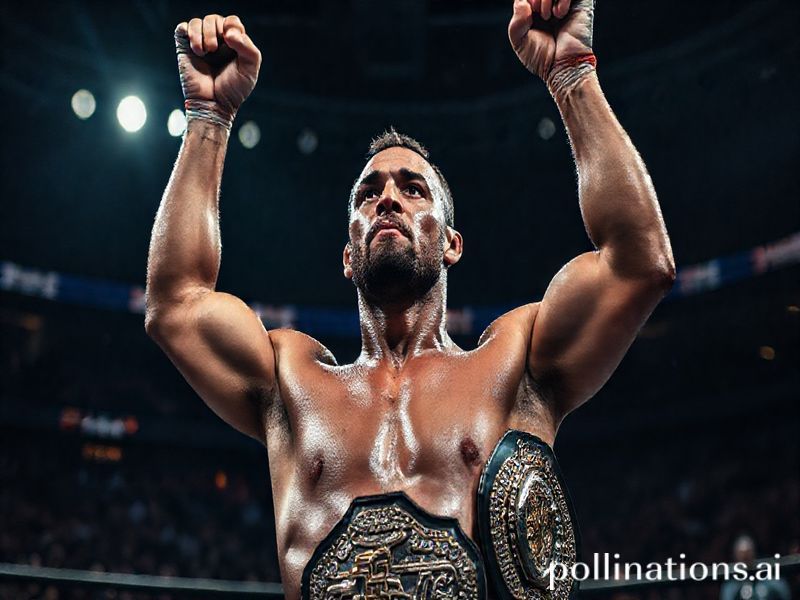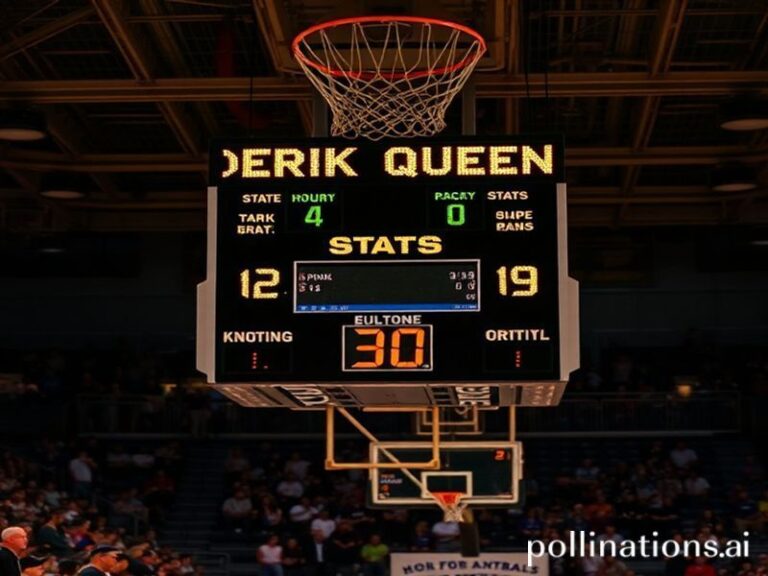jon jones
Jon Jones: Humanity’s Last Riot-Control Specialist
By Dave’s Foreign Correspondent, filed from a hotel bar where CNN is muted but the fight replays never are
The first time most of the planet heard about Jon Jones, he wasn’t being celebrated for his footwork or his ability to fold human joints like origami; he was on the evening news in Lagos because an American cable network cut to a police chase. A rented Bentley, a pregnant driver, a pole, and—voilà—international incident. Viewers from Lagos to Lahore shrugged: “Ah, America’s at it again—exporting both fast food and faster moral implosions.”
Yet the same clip played differently in Rio’s favelas and Manila’s esports cafés. To them, Jones was a glitch in the imperial matrix: a Black athlete with Nike money, police immunity, and a highlight reel that could crash Twitter. The world didn’t see a champion; it saw a stress test for American exceptionalism. If the UFC’s reigning light-heavyweight-cum-heavyweight could dodge handcuffs as smoothly as he dodged punches, what did that say about the rules-based order Washington keeps mailing to other continents?
Global fight promoters took notes. From Abu Dhabi’s Fight Island to Saudi Arabia’s “Rage on the Red Sea,” sheikhs realized that booking Jones was cheaper than buying a fleet of Eurofighters and twice as effective at projecting soft power. You can’t buy that kind of deterrence at the Paris Air Show. When Jones stepped into the cage in Riyadh, the arena’s VIP section looked like a Davos panel cross-bred with a rap video: oligarchs, TikTok princelings, and a former CIA director comparing takedown percentages over mocktails. Somewhere, a Norwegian peace researcher updated her dissertation on “sports-washing” with the enthusiasm of a tax auditor discovering undeclared Bitcoin.
Meanwhile, in the banlieues of Paris and the townships of Johannesburg, kids streamed his fights on cracked phones, practicing spinning elbows between shifts at the cell-phone kiosk. Jones became a case study in the globalization of outlaw chic: the same algorithm that recommends Reggaeton in Jakarta hands you a slow-motion replay of Jones obliterating a Swedish contender’s orbital bone. Cultural diffusion, sponsored by energy-drink manufacturers who promise wings but mostly deliver gout.
The Russian sports minister, never one to miss a geopolitical metaphor, called Jones “useful chaos.” Moscow state TV spliced his controversies—failed drug tests, hit-and-run, domestic allegations—into montages meant to demonstrate the West’s moral rot. Irony died quietly when the same network cut to a glitzy Moscow gala honoring an undefeated Dagestani who once posed with a pet tiger and a sanctioned Kalashnikov. Somewhere in the Kremlin, an intern updated the “whataboutism” spreadsheet.
China watched with the detached curiosity of a superpower that still bans MMA on state television but live-tweets every weigh-in from Macau. The Party’s sports analysts concluded that Jones’s greatest asset isn’t reach or ringcraft but narrative elasticity: he can be villain, victim, or redemption arc depending on the time zone. That’s soft-power gold in an era when the Belt and Road Initiative needs digestible content between infrastructure loans. Expect a docu-series—“From Albuquerque to the Great Wall”—by 2025, executive-produced by whoever isn’t in prison by then.
And yet, for all the diplomatic shadow-boxing, the most poignant Jones moment happened far from spotlights. In a refugee camp outside Athens, a Syrian teenager shadow-boxed wearing a torn Jon Jones T-shirt donated by an NGO clothing drive. When asked why Jones, the kid shrugged: “He keeps getting knocked down and still gets back up.” That, more than any pay-per-view buy rate, is the global takeaway—an inadvertent parable about resilience in an age when everyone’s a main-event fighter, whether the cage is an octagon or a border fence.
Conclusion? Jon Jones is not merely America’s problem child or the UFC’s balance sheet; he’s a Rorschach test on every continent. Some see imperial impunity, others see aspirational grit, and the rest of us just see pay-per-view receipts that could fund a medium-sized hospital. In the end, the planet spins, governments rise and fall, but the octagon remains—eight sides of reinforced fence where we project our collective id and pretend it’s sport. And somewhere, Jones is warming up, because the world always needs a main event, and history loves a heel who can sell tickets.







